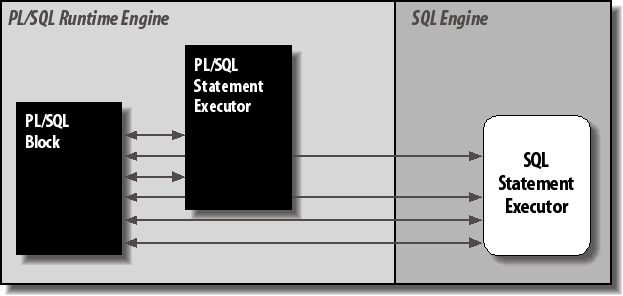Bulk Processing for Multirow SQL
Oracle introduced a significant enhancement to PL/SQL’s SQL-related capabilities with the FORALL statement and BULK COLLECT clause for queries. Together, these are referred to as bulk processing statements for PL/SQL. Why, you might wonder, would this be necessary? We all know that PL/SQL is tightly integrated with the underlying SQL engine in the Oracle database. PL/SQL is the database programming language of choice for Oracle—even though you can now use Java inside the database as well.
But this tight integration does not mean that there is no overhead associated with running SQL from a PL/SQL program. When the PL/SQL runtime engine processes a block of code, it executes the procedural statements within its own engine, but passes the SQL statements on to the SQL engine. The SQL layer executes the SQL statements and then returns information to the PL/SQL engine, if necessary.
This transfer of control (shown in Figure 21-2) between the PL/SQL and SQL engines is called a context switch. Each time a switch occurs, there is additional overhead. There are a number of scenarios in which many switches occur and performance degrades. As you can see, PL/SQL and SQL might be tightly integrated on the syntactic level, but “under the covers” the integration is not as tight as it could be.

Figure 21-2. Context switching between PL/SQL and SQL
With FORALL and BULK ...
Get Oracle PL/SQL Programming, 5th Edition now with the O’Reilly learning platform.
O’Reilly members experience books, live events, courses curated by job role, and more from O’Reilly and nearly 200 top publishers.

